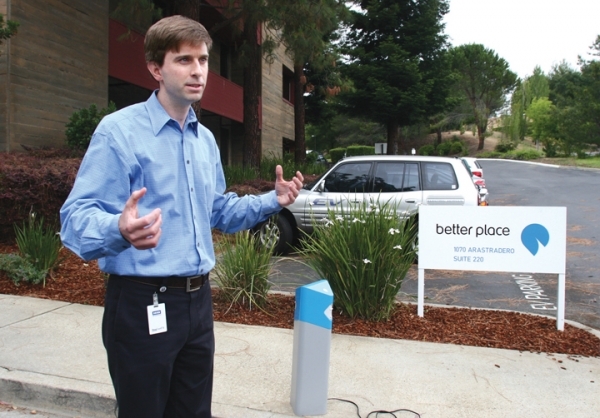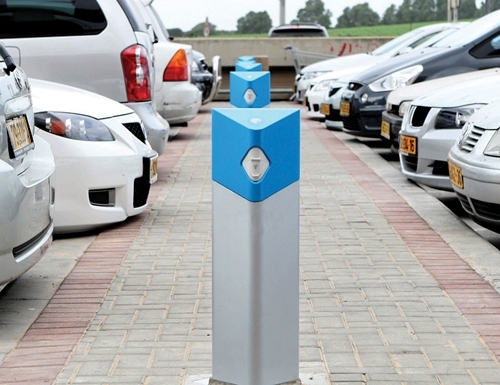Better Place, a Palo Alto company that in recent years has become synonymous with the city's drive to promote electric vehicles, plans to shutter its local headquarters in the coming months and focus its energies on Israel and Denmark.
The company installs networks of car-charging stations and battery-swap stations (most notably in Israel and Denmark). It announced that it is putting on hold its efforts in the United States and in Australia so that it can focus on the two nations where its technologies are already in use.
The company has raised about $750 million since its founding in 2007 and plans to leave its Embarcadero Way headquarters in the next few months, said John Proctor, company spokesman. The precise timing of the office closure is unknown because the company is "doing an orderly wind-down" and honoring its commitments to partners and suppliers, he added.
Since its inception, Better Place has enjoyed a reputation as one of the hottest and most promising electric-vehicle pioneers to set up shop in Palo Alto. The city has aggressively promoted electric vehicles as part of its broader initiative to curb climate change -- an effort that has included installing charging stations in local garages and welcoming recent arrivals such as Fisker and Tesla. (The city's sense of pride in electric vehicles is reflected in the fact that Tesla will host Mayor Greg Scharff's "State of the City" speech next Wednesday, Feb. 27).
Better Place's departure from Palo Alto will no doubt put a dent it in the city's reputation as ground zero for electric-vehicle innovation. Founded by former SAP employee Shai Agassi, the company has stood out by focusing its efforts not on electrical vehicles themselves but on alleviating drivers' anxieties about running out of juice. Better Place has also worked with car companies, including Nissan and Renault, to make electric vehicles more accessible.
While Better Place is winding down its American activities, the company remains committed to its ongoing operations in Denmark and Israel, where its efforts have already made a mark. In an email, Proctor told the Weekly that the company still believes in its long-term potential in North America and is "leaving the door open to resume activities in the U.S. after proving scalability in Denmark and Israel, as circumstances permit."
"We have customers on the road using our fully operational, nationwide networks in Denmark and Israel," Proctor wrote. "The time has come to focus and to demonstrate to our customers, suppliers and investors that we have a sustainable, scalable model. This means all energy and resources go into these two countries in the short term."
He declined to say how many jobs would be impacted by the closure of the headquarters, noting only that the company's operations "already were relatively lean in the U.S."
The company's transition is unlikely to surprise industry observers. While the Better Place has been aggressively pursuing its mission in Israel and Denmark, some of its ambitious plans for California and Australia have not been realized. In a 2009 interview, Better Place officials told the Weekly they were hoping to install charging-station networks in California and in Australia by as early as 2012. That infrastructure has not materialized.
The company has also seen a leadership shake-up in recent months, with Agassi resigning from the CEO position last October and his successor, Eric Thornley, leaving last month. The company's new CEO, Dan Cohen, maintained in a statement last week that the company has demonstrated that it "works as a concept."
"We need to prove to our customers, suppliers and investors that we have a sustainable, scalable model," Cohen said. "To do so we are now focusing on realizing the full potential of what we have built, and that means concentrating our resources and energy in the near term, on Denmark and Israel, where we have customers on the road enjoying our switching and charging stations."
"At the same time, we had to make some difficult decisions on actions to be taken elsewhere in the world," Cohen said.




Comments
Crescent Park
on Feb 13, 2013 at 7:37 pm
on Feb 13, 2013 at 7:37 pm
Heavily subsidized gasoline prices and low interest in reducing air pollution in the US make alternative-fuel vehicles less interesting than in more advanced countries.
Another Palo Alto neighborhood
on Feb 13, 2013 at 7:37 pm
on Feb 13, 2013 at 7:37 pm
Well, seems that some of Palo Alto's grand plan ideas are not exactly coming to fruition--
Palo Alto charges forth with electric-vehicle plan:
Web Link
Wonder if anyone at City Hall can provide the public a status report on all this nonsense?
Embarcadero Oaks/Leland
on Feb 14, 2013 at 6:53 am
on Feb 14, 2013 at 6:53 am
The US is years removed from charging and battery changing stations. Gas is still much too cheap, so we just don't have nearly enough electric vehicles to make this business model profitable for a company like Better Place.
Professorville
on Feb 14, 2013 at 8:17 am
on Feb 14, 2013 at 8:17 am
Electric cars are too expensive, the batteries are heavy and expensive, recharging is expensive at five dollars per hour and takes too long at eight hours. The reliability is not too good, either, at least in the Tesla. Battery disposal is problematic, as they are very toxic. Also, the electricity they run on is often produced by coal.
There are just too many big negatives that outweigh the positives!
Professorville
on Feb 14, 2013 at 10:51 am
on Feb 14, 2013 at 10:51 am
Depends on how much power they're pushing out but unless it's a very high power charger, anyone charging $5/hr for an electric charger is ripping you off. At the Palo Alto mid-tier residential rate of $0.12/kWh (which is also the national average residential rate for electricity) a typical level 2 charger (10kW) would use $1.20 worth of electricity per hour, recharging about 30 miles of range per hour given typical electric car efficiencies (300 Wh/mi). BTW, $0.12/kWh * 0.3 kWh/mi = $0.04/mi, i.e. not very expensive.
Midtown
on Feb 14, 2013 at 11:16 am
on Feb 14, 2013 at 11:16 am
If every gas station had a quick charger range anxiety would vanish. Big oil is not going to let that happen.
Barron Park
on Feb 14, 2013 at 11:58 am
on Feb 14, 2013 at 11:58 am
Electric vehicles are not efficient and cost to much to build and maintain and the US government under Obama gives a taxpayer paid credit for buying these monstrosities. The Volt is a failure, as are all electric vehicles. Thse companies, like solar cell and panel companies, are just a scam to steal US taxpayer money doled out by Obama and company until they go bankrupt, like Solyra.
Good riddance to Better Place and all electric cars.
Menlo Park
on Feb 14, 2013 at 12:28 pm
on Feb 14, 2013 at 12:28 pm
They laughed at Evinrude.
Duveneck/St. Francis
on Feb 14, 2013 at 1:46 pm
on Feb 14, 2013 at 1:46 pm
Sounds like the "new and snobby" Palo Alto. Run many companies out of town because they tax the hell out of the companies. Oh, how I miss the old Palo Alto!
Another Palo Alto neighborhood
on Feb 14, 2013 at 3:03 pm
on Feb 14, 2013 at 3:03 pm
We looked into getting a car charger for our garage, and we're told that it required. 220 volt plug-in socket first, and there was no special rate for recharging electric cars. My husband has a top employee who lives in Berkeley, of all places, and he was told the same thing. he worked it all out, and it would cost him $200 per week to recharge his car, on top of the enormous electric car payment. Plus, how to dispose of the battery when it dies? Just not practical for a battery with a range of only forty miles.
Tesla used to claim a range of 400 miles, but Top Gear, the British TV show, proved it to be only 50. They also proved the brakes at that time to be faulty. The NY Times had similar complaints last week. Reliability is a big issue. Apparently, electric cars do not fare well in temps below 40 degrees.
Charleston Gardens
on Feb 14, 2013 at 3:46 pm
on Feb 14, 2013 at 3:46 pm
We- your comments do not match my reality. I have had a Chevy Volt for 20 months and find it very functional - and fun!I just plug it into a regular 110v outlet in my garage each night before going to bed and the next morning it is fully charged. I get around 35 miles per charge, but never worry about the battery going dead. The Volt, like the Fisker, has a gasoline powered generator on board that will supply electricity when the battery is depleted. I could easily drive it across country, without worry about recharging, as long as I could find regular gas stations.
I now have about 9,500 miles on the car, and have averaged 184 miles per gallon of gas. As mentioned above, I find my electricity cost are about similar at $0.04 per mile. I have no idea how your husband's employee arrived at $200 per week. He would have to drive 5,000 miles per week to run up $200 worth of electricity.
The batteries are good for 10 years, and are replaceable through the dealership. A car's battery is considered "used up" when it has about 75% of its life left. These are still good batteries for other uses. They make excellent storage devices for solar and wind power generated electricity...
Chevy sold over 24,000 Volts in 2012, and Cadillac has announced their ELR Sports Coupe, based on the Volt, for delivery next winter.
Better Place has a great idea, but it requires commitment of a full infrastructure. They are concentrating on the two countries where that commitment exists. The U.S. still only has a full commitment to a petroleum based infrastructure. We will see what the future brings. I know I am hoping petroleum can be saved as a raw material for plastics and a thousand other materials.
Stanford
on Feb 14, 2013 at 4:32 pm
on Feb 14, 2013 at 4:32 pm
At least no taxpayer money was lost. Did the article state that they have lost 500 million dollars? Must have missed that.